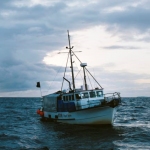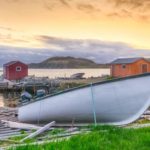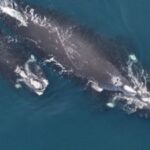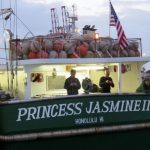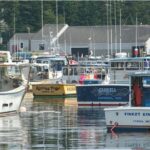U.S. Rep. Jeff Van Drew, D-2nd, joined Alaskan Rep. Don Young, a Republican, to introduce a bill reauthorizing the Magnuson-Stevens Fishery and Conservation Management Act on Thursday. But the bill would make changes to the law that some environmentalists fear may result in taking more fish than is sustainable. Among other things, the reauthorization would change how fishery councils determine fishery stock rebuilding timeframes, giving the public a greater role in the development of science and fishery management plans. In a statement, Van Drew said H.R. 3697 “ensures that we have healthy fisheries, keep anglers in the water and keep fishermen fishing.” >click to read< 09:10
Tag Archives: garden-state-seafood-association
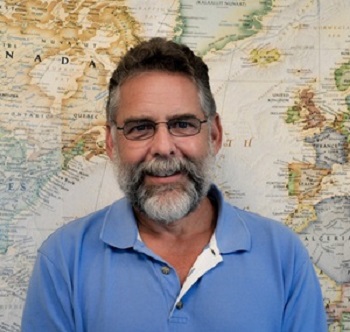
Lund’s Fisheries’ Jeff Kaelin Appointed to Atlantic States Marine Fisheries Commission as Gov. Murphy’s Proxy
The Garden State Seafood Association is pleased to announce that Mr. Jeff Kaelin, of Lund’s Fisheries in Cape May, New Jersey has been confirmed by the Senate as Governor Phil Murphy’s proxy to the Atlantic States Marine Fisheries Commission (ASMFC). This represents the first time in nearly twenty years that New Jersey commercial fishermen have had a representative on the ASMFC. Garden State Seafood Association ‘I am extremely honored to have been chosen by Governor Murphy for this position and thank Senate President Scutari and Senator Testa for supporting me through the confirmation process. It has been a long wait and I’m excited to get to work on behalf of New Jersey,’ said Kaelin. >click to read< 19:00

Offshore wind farms threaten New Jersey’s shellfish industry. Should fishing communities be compensated?
Earlier this month, New Jersey announced it would join eight other states that are seeking a regional approach to compensate fishing communities for the impending losses. “Are we going to be allowed to fish inside of them (the wind turbine fields)?” asked Kirk O. Larson, a scallop fleet owner and mayor of Barnegat Light, New Jersey. “Why did (the federal Bureau of Ocean Energy Management) put a wind farm right inside of a scallop area, the most productive scallop area pretty much on the East Coast, not counting Georges Bank.” Shellfish harvesters like Larson are expected face serious financial damage from offshore wind development projects. “I’m not looking for compensation,” said the scallop fleet owner. “I’m looking for work, so I’m not really looking for welfare.” >click to read< 07:43
Markey, Moulton push for national fund to compensate fishermen for losses due to offshore wind >click to read<
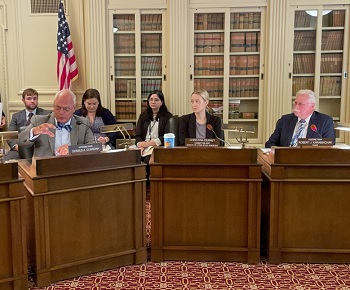
“It’s a step too far for us” – New Jersey lawmakers advance bill to study energy from waves and tides
When it comes to renewable energy, solar power and wind turbines hog all the headlines. Thursday, legislators advanced Assemblyman Robert Karabinchak’s bill that would require the state to study ocean energy potential and set goals in wave and tidal energy generation. The Assembly’s infrastructure and natural resources committee, which Karabinchak chairs, unanimously agreed to advance the bill, which would also require the state to add wave and tidal energy to its energy master plan and authorize pilot projects to test their efficacy. The approval came despite objections from an advocate for commercial fisheries, who warned the “industrialization of our ocean” — already underway with offshore wind projects — will obliterate fishing grounds. “We will not be able to fish in these locations,” said Scot C. Mackey, who represented the Garden State Seafood Association. >click to read< 08:16
With the Ocean Wind Offshore Wind Farm on the horizon, a storm is building
Ocean Wind, according to those closely following the project, is headed for a series of turf wars, loud debates and protracted legal battles, even before the first turbine is sited off the coast of southern New Jersey.,, even supporters and opponents of the proposed wind farm at times disagree among themselves on how to move forward. Environmentalists, commercial fishermen, recreational boaters, labor unions, homeowners, boardwalk businesses, NIMBYs and ratepayer advocates are all circling Orsted, the Dutch wind power company behind what could be one of the largest wind farms in North America. Local, state and federal officials are also starting to feel the heat. Just about everyone involved, including David Hardy, CEO of Orsted US, worries the project could devolve into chaos. >click to read< 13:11
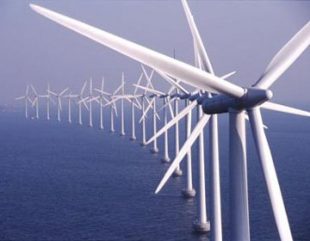
State of New Jersey Needs to Address Community Offshore Wind Farm Concerns
Oersted is currently seeking federal permits for its planned 99 turbine wind farm 15 miles off the southern New Jersey coast. Public meetings held by the Bureau of Ocean Energy Management held in April did little to calm the growing skepticism surrounding the project. Cape May County’s economy is heavily dependent on tourism and commercial fishing.,, Save Our Shores argues that the turbines pose a threat to migratory birds and marine mammals. The Sierra Club says those opposing the wind farms are doing so based on bad science. The Garden State Seafood Association contends that the location studies did not consider the potential negative impact on commercial fishing. >click to read< 08:22
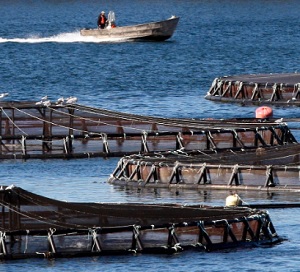
Opposition grows to expanding fin fish farming
The Trump administration and the aquaculture industry said the order, which is being implemented now, represents common sense steps to ease the burden of rules on fish farmers. “They’re trying to somehow connect open-water aquaculture with the need for domestic food. But it just doesn’t make sense,” said Marianne Cufone, executive director of the Recirculating Farms Coalition,,, Some fishing groups have also come out in support of the order. Scot Mackey, director of government affairs for the Garden State Seafood Association, which advocates for fishermen as well as farmers, said the order “will help the industry weather the current crisis and come back stronger.” Neville Crabbe, spokesman for the Atlantic Salmon Federation, a conservation group, said the federal permitting process should be creating land-based aquaculture rather than fish farms in the ocean, let alone offshore. >click to read< 18:13
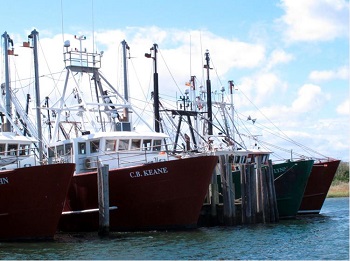
New Jersey commercial fishing operations counting on relief funds to stay in business
The Garden State Seafood Association is hoping the $11 million recently allocated to New Jersey’s seafood industry as part of the coronavirus stimulus law will prepare it for reopening. “The money should go to those businesses that have a proven negative impact from the COVID pandemic and should be used to help keep as many fishing businesses in operation as possible,” Scot Mackey, the Garden State Seafood Association (GSSA) Government Affairs director based in Trenton, told The Center Square. “I am concerned that the dollars seemed to flow to states regardless of the impact of the pandemic,” Mackey said. “I don’t think Alaska seafood has experienced the same impact as … the East Coast.” >click to read< 12:37
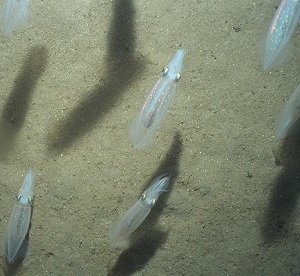
Squid Fishery Responsible for Over 2,500 Jobs, $240 Million in Economic Impact in New England and Mid-Atlantic region
Fishing for longfin squid brings in tens of millions of dollars in annual revenue and supports thousands of full-time jobs, according to a new study from the Science Center for Marine Fisheries (SCEMFIS). “Loligo squid is a significant part of our business and is also a Marine Stewardship Council-certified, sustainable fishery with its products in demand in the U.S., Europe and Asia,” said Jeff Kaelin, Director of Sustainability and Government Relations for Lund’s Fisheries, in Cape May, New Jersey. “This study shows the extent to which our fishery has grown in size and economic importance, which needs to be considered by both fishery and wind-energy regulators making decisions impacting our future.” >click to read< 16:44
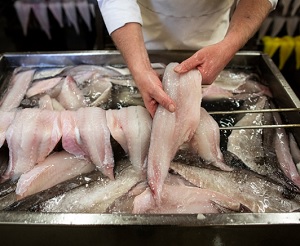
Coronavirus: Commercial fishing industry on the ropes as pandemic-era shoppers avoid seafood
Fisherman Marty Scanlon has not returned to his Long Island home since leaving for North Carolina at the beginning of the coronavirus pandemic in New York. Scanlon, a longliner captain from Hauppauge left for North Carolina in early March — roughly the same time the first case of Covid-19 emerged in Manhattan. In the weeks that followed, Gov. Andrew Cuomo ordered most businesses to close, effective March 22, casting a pall over New York City restaurants in a once-bustling culinary capital. Business for Scanlon has been brutal ever since. “We basically don’t have the money to go home,” Scanlon said, over the phone. “We can’t go home til we pay our bills.” >click to read< 08:32
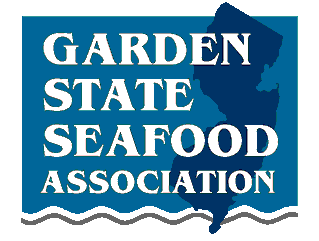
New Jersey Legislature Succumbs to Humane Society’s Misinformation Campaign Against Sustainable Shark Fishing
The Garden State Seafood Association (GSSA) is disappointed with the passage of Assembly Bill A4845/S2905 today, which would prohibit the possession, sale, or trade of legally harvested shark fins in New Jersey.,,, “All this legislation does is to penalize legitimate, hard working fishermen of the state,” said Greg DiDomenico, Executive Director of GSSA. “Instead of acknowledging the leadership of our commercial industry, which operates a globally-recognized sustainable shark fishery, those supporting this legislation will penalize New Jersey fishermen, forcing them to discard a natural resource for no purpose.” >click to read< 09:15
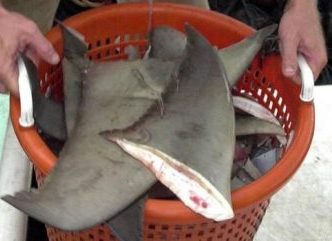
Fisherman: New Jersey shark fin ban bill punishes wrong people
A New Jersey assembly committee will vote on a bill Monday that would prohibit the selling, trading, distribution or possession of any shark fin that has been separated from a shark prior to its lawful landing. The bill is part of a larger national and international movement to crack down on illegal shark finning, but fishing industry members here say this particular bill will also hurt local fishermen not involved in the illegal trade.,,, Greg DiDomenico, president of the Garden State Seafood Association, said the act will harm the legitimate U.S. fishermen. “The U.S. is a leader in shark conservation and this legislation causes waste in U.S. fisheries,” DiDomenico said. >click to read<11:48

Reintroduced Shark Trade Bill Promotes Successful U.S. Conservation Policies at Policies at Global Level
The Sustainable Shark Fisheries and Trade Act of 2019 – A bipartisan bill introduced in the U.S. House advances global shark conservation by ensuring that all shark and ray products imported into the United States meet the same high ethical and sustainability standards required of American fishermen. The bill has broad support from conservation groups, zoos, aquariums and the fishing industry. >click to read<13:14
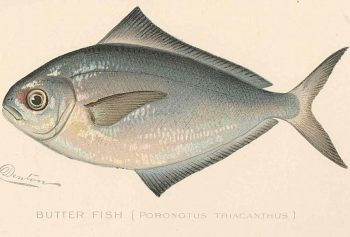
This fish is delicious and sustainable, but nobody’s buying
If someone mentions butterfish you may smack your lips, absolutely want to avoid it, or just scratch your head.,,, The confusion is relevant because the real butterfish could appear at a restaurant near you. In 2017 the National Oceanic and Atmospheric Administration found that Atlantic butterfish “are not overfished and not subject to overfishing.” They’re tasty too. “I love them, they’re absolutely delicious,” said Gregory DiDomenico, executive director of the Garden State Seafood Association. Commercial fishermen have taken note. DiDomenico told NOAA that “people are very much looking forward to getting into this fishery. That means jobs on the boat, jobs at the plant, and fishermen buying more gear.” >click to read<10:33
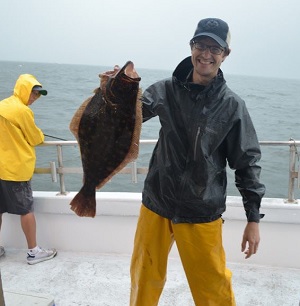
Climate change moving fish north, threatening turf wars, study says
World conflict is likely to increase over access to fisheries, as species move north in response to a warming ocean, according to a Rutgers University study published last week in the journal Science. “Seventy or more countries will likely have to start sharing with their neighbors” in coming decades, said lead author Malin Pinsky, including the U.S., Canada and Mexico.,, Gregory DiDomenico, executive director of the Garden State Seafood Association, said northern states such as New York argue they should now get a larger allotment for their fishing industries. He said allotments, which are set by the Atlantic States Marine Fisheries Commission and the Mid-Atlantic Fishery Management Council, are based on the history of landings by state. >click to read<23:32
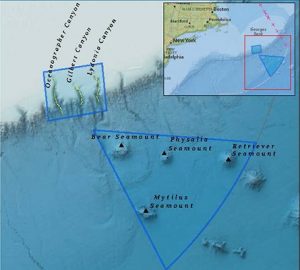
The High-Stakes Battle Over Obama’s Atlantic Ocean National Monument
Mining and drilling for oil are already banned in the Northeast Canyons and Seamounts Marine National Monument, established by former president Barack Obama in 2016 as the first marine monument in the Atlantic Ocean, 150 miles off the coast of Cape Cod. Within five years, too, all commercial fishing will be phased out – or, at least that was the plan. A federal judge is now weighing the fate of those protections in a lawsuit originally filed in March 2017 by a coalition of New England fishing groups – and it has led to a rare case of President Donald Trump defending his predecessor’s authority. >click to read<10:27
Access to Surfclam Fishing Grounds Studied by SCeMFiS Scientists in Research Survey Cruise Southeast of Nantucket Island
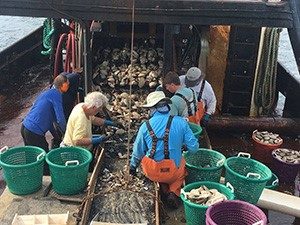 August 11, 2017, Boston, MA. – The scientists of the Science Center for Marine Fisheries (SCeMFiS) recently completed a survey of the surfclam fishery area southeast of Nantucket Island to provide information regarding surfclam stock status and habitat to ensure continued resource access by local surfclam vessels. Surveys were successfully conducted in 4 days aboard the F/V Mariette sailing from New Bedford, MA… SCeMFiS scientific projects are unique in that they respond directly to the scientific needs of the fisheries managers in collaboration with the commercial fishing industry while upholding strict quality scientific standards and procedures. click here to read the press release 15:07
August 11, 2017, Boston, MA. – The scientists of the Science Center for Marine Fisheries (SCeMFiS) recently completed a survey of the surfclam fishery area southeast of Nantucket Island to provide information regarding surfclam stock status and habitat to ensure continued resource access by local surfclam vessels. Surveys were successfully conducted in 4 days aboard the F/V Mariette sailing from New Bedford, MA… SCeMFiS scientific projects are unique in that they respond directly to the scientific needs of the fisheries managers in collaboration with the commercial fishing industry while upholding strict quality scientific standards and procedures. click here to read the press release 15:07
A Hudson Canyon-sized power struggle is developing 100 miles off N.J.’s coast
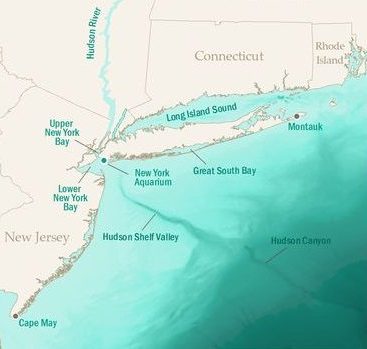 In November 2016, the Wildlife Conservation Society nominated Hudson Canyon to be designated a National Marine Sanctuary. The WCS selected the canyon, the largest submarine crevice on the Atlantic Coast, due to its wide biodiversity. The canyon is home to more than 20 protected species, including the North Atlantic right whale, according to the conservation group. “This is a canyon the scale of the Grand Canyon,” said Jon Forrest Dohlin, the Vice President of the WCS and the director of the New York Aquarium. “It seemed like something that could really benefit from awareness and protection.” But commercial fishermen see this as the latest in a series of moves that could lead to increased fishing restrictions from the Gulf of Maine to the Gulf of Mexico. Commercial fishermen in New Jersey fear losing access to a profitable fishing ground. According the Greg DiDomenico, the executive director of the Garden State Seafood Association, click here to read the story 09:54
In November 2016, the Wildlife Conservation Society nominated Hudson Canyon to be designated a National Marine Sanctuary. The WCS selected the canyon, the largest submarine crevice on the Atlantic Coast, due to its wide biodiversity. The canyon is home to more than 20 protected species, including the North Atlantic right whale, according to the conservation group. “This is a canyon the scale of the Grand Canyon,” said Jon Forrest Dohlin, the Vice President of the WCS and the director of the New York Aquarium. “It seemed like something that could really benefit from awareness and protection.” But commercial fishermen see this as the latest in a series of moves that could lead to increased fishing restrictions from the Gulf of Maine to the Gulf of Mexico. Commercial fishermen in New Jersey fear losing access to a profitable fishing ground. According the Greg DiDomenico, the executive director of the Garden State Seafood Association, click here to read the story 09:54
Wildlife Conservation Society’s New York Aquarium wants Hudson Canyon National Marine Sanctuary designation
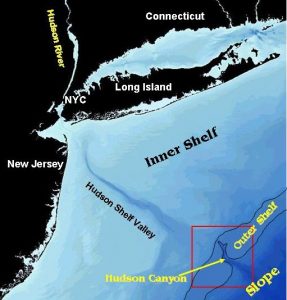 Fishermen not on board with Hudson Canyon Sanctuary – The Mid-Atlantic Fishery Management Council will hear a proposal from New York Aquarium, which has nominated the canyon for a National Marine Sanctuary designation. The sanctuary program is run by the National Oceanic and Atmospheric Administration. In the program’s 40 years of existence 13 national marine sanctuaries and two marine national monuments have been established. The sanctuaries are to be tailored to the needs of its stakeholders. (This does not include you, Fishermen) New Jersey fishermen however, are raising concerns that they will be shut out of a prolific fishing ground. “We’re in complete opposition. We’re not going to be fooled by the notion that the aquarium doesn’t intend to severely restrict fishing over time,” said Greg DiDomenico, Executive Director, Garden State Seafood Association. (We also oppose this) click here to read the story 09:48 Little-known-Underwater-Canyon-off-New-York-and-New-Jersey-Nominated-as-National-Marine-Sanctuary 09:58
Fishermen not on board with Hudson Canyon Sanctuary – The Mid-Atlantic Fishery Management Council will hear a proposal from New York Aquarium, which has nominated the canyon for a National Marine Sanctuary designation. The sanctuary program is run by the National Oceanic and Atmospheric Administration. In the program’s 40 years of existence 13 national marine sanctuaries and two marine national monuments have been established. The sanctuaries are to be tailored to the needs of its stakeholders. (This does not include you, Fishermen) New Jersey fishermen however, are raising concerns that they will be shut out of a prolific fishing ground. “We’re in complete opposition. We’re not going to be fooled by the notion that the aquarium doesn’t intend to severely restrict fishing over time,” said Greg DiDomenico, Executive Director, Garden State Seafood Association. (We also oppose this) click here to read the story 09:48 Little-known-Underwater-Canyon-off-New-York-and-New-Jersey-Nominated-as-National-Marine-Sanctuary 09:58
Decision on preliminary injunction on offshore sale in ‘coming days’
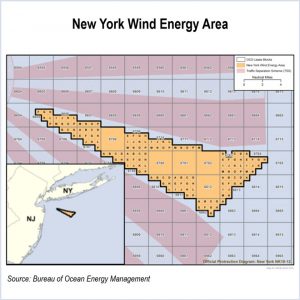 A US court is expected to issue a ruling in the coming days on a lawsuit seeking a preliminary injunction against the development of the up to 1GW New York offshore wind farm lease area. The Fisheries Survival Fund (FSF), which represents the majority of the limited access Atlantic scallop fleet, is the lead plaintiff in the lawsuit that alleges the Bureau of Ocean Energy Management (BOEM) leasing process did not adequately consider the impact of wind power development on the region’s fishermen. The plaintiffs, which also include the Garden State Seafood Association and the Long Island Commercial Fishing Association, argue that allowing the lease sale to go through would cause irreparable harm to commercial fishermen. Norwegian oil major Statoil won the December auction for the right to develop the 32,000-hectare site off the coast of Long Island with a bid of $42.5m. BOEM has delayed execution of the lease until the court has ruled on the preliminary injunction. Link 09:33
A US court is expected to issue a ruling in the coming days on a lawsuit seeking a preliminary injunction against the development of the up to 1GW New York offshore wind farm lease area. The Fisheries Survival Fund (FSF), which represents the majority of the limited access Atlantic scallop fleet, is the lead plaintiff in the lawsuit that alleges the Bureau of Ocean Energy Management (BOEM) leasing process did not adequately consider the impact of wind power development on the region’s fishermen. The plaintiffs, which also include the Garden State Seafood Association and the Long Island Commercial Fishing Association, argue that allowing the lease sale to go through would cause irreparable harm to commercial fishermen. Norwegian oil major Statoil won the December auction for the right to develop the 32,000-hectare site off the coast of Long Island with a bid of $42.5m. BOEM has delayed execution of the lease until the court has ruled on the preliminary injunction. Link 09:33
N.J. Recreational fishermen push for pots off state’s artificial reefs
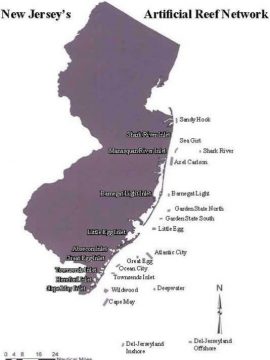 Recreational fishing clubs and divers threw their support behind special management zone status for 13 reef sites at the Mid-Atlantic Marine Fisheries Council public hearing held Wednesday in Toms River. The designation could prohibit the use of any gear on the reefs except hook and line and spear fishing, and the taking of fish by hand. In other words, it would eliminate fish traps principally used by commercial fishermen. A couple lobster men spoke their opposition to any plan that would deny them use of the ocean floor. Greg DiDomenico, the head of the commercial fishing trade group Garden State Seafood Association, said he didn’t doubt the existence of gear conflicts on the reefs but would like to see a compromise made instead. Read the story here 09:45
Recreational fishing clubs and divers threw their support behind special management zone status for 13 reef sites at the Mid-Atlantic Marine Fisheries Council public hearing held Wednesday in Toms River. The designation could prohibit the use of any gear on the reefs except hook and line and spear fishing, and the taking of fish by hand. In other words, it would eliminate fish traps principally used by commercial fishermen. A couple lobster men spoke their opposition to any plan that would deny them use of the ocean floor. Greg DiDomenico, the head of the commercial fishing trade group Garden State Seafood Association, said he didn’t doubt the existence of gear conflicts on the reefs but would like to see a compromise made instead. Read the story here 09:45
Commercial Fishermen Question Obama’s Ocean ‘Monument’ Preserve
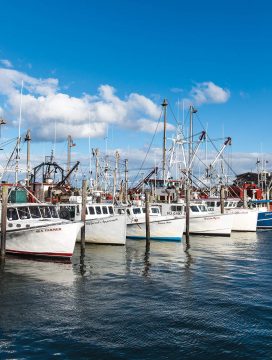 “All commercial fishing is excluded from the area, but fisheries in the top 10 to 20 feet, no way in the world they’re going to impact the bottom,” pointed out Nils Stolpe, communications director of the association. Such is the case for a lot of the Barnegat Light-based boats, he said, for example, longliners and some hook-and-line tuna boats. “They’re fishing 3 miles up above all of this on the ocean floor.” “Longliners are probably affected more than any of our other fisheries up there” by the declaration, said Ernie Panacek, general manager at Viking Village Commercial Seafood Producers in Barnegat Light. “Our bottom longlining boats and surface longlining for sword and tuna boats are going to be affected up there.” Golden tilefish is found on the bottom and tuna and sword on the surface, “and they’re banning all commercial fishing,” Panacek noted. “It’s not a big area, necessarily, but my biggest concern is an expansion of this national monument just like they did in Hawaii,” he added. Panacek said fishermen have done “extensive work” with the Mid-Atlantic Fisheries Council and the Garden State Seafood Association to protect deep-sea coral reefs and sea mounts in the North Atlantic, and were awarded for it. “And now President Obama had to step ahead and do this; I don’t understand,” Panacek said. The federal Magnuson Stevens Act has been managing these areas “and they have been managed properly,” he said. Read the story here 17:47
“All commercial fishing is excluded from the area, but fisheries in the top 10 to 20 feet, no way in the world they’re going to impact the bottom,” pointed out Nils Stolpe, communications director of the association. Such is the case for a lot of the Barnegat Light-based boats, he said, for example, longliners and some hook-and-line tuna boats. “They’re fishing 3 miles up above all of this on the ocean floor.” “Longliners are probably affected more than any of our other fisheries up there” by the declaration, said Ernie Panacek, general manager at Viking Village Commercial Seafood Producers in Barnegat Light. “Our bottom longlining boats and surface longlining for sword and tuna boats are going to be affected up there.” Golden tilefish is found on the bottom and tuna and sword on the surface, “and they’re banning all commercial fishing,” Panacek noted. “It’s not a big area, necessarily, but my biggest concern is an expansion of this national monument just like they did in Hawaii,” he added. Panacek said fishermen have done “extensive work” with the Mid-Atlantic Fisheries Council and the Garden State Seafood Association to protect deep-sea coral reefs and sea mounts in the North Atlantic, and were awarded for it. “And now President Obama had to step ahead and do this; I don’t understand,” Panacek said. The federal Magnuson Stevens Act has been managing these areas “and they have been managed properly,” he said. Read the story here 17:47
N.J. fishermen fear loss of huge underwater sand hill, the Manasquan Ridge
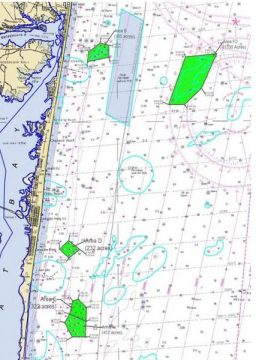 The appearance of the 123-foot offshore supply vessel Scarlett Isabella on the Manasquan Ridge is a bad omen to Capt. Jim Lovgren, a Point Pleasant Beach commercial fishermen. The Scarlett was in the hire of the Bureau of Ocean Energy Management, which is looking for potential sand on the outer continental shelf that could be pumped up onto the Jersey beach. Tampering with these sand beds, which are long-established fishing areas, could reshape the fishing communities at the Shore, fishermen say. The ridge, which starts to rise off the ocean floor 5 ½ miles southeast of Manasquan Inlet, is one of those potential resources of sand. “Last year word was that Manasquan Ridge was a last resort for beach replenishment use. The fact that they are paying a survey vessel to crisscross it clearly says something different,” said Lovgren, who sits on the Executive Board of the Garden State Seafood Association. Fishermen have been weary of a conflict with the Army Corps of Engineers over the ridge, and others nearby, which they depend on to hold fish. Read the story here 17:48
The appearance of the 123-foot offshore supply vessel Scarlett Isabella on the Manasquan Ridge is a bad omen to Capt. Jim Lovgren, a Point Pleasant Beach commercial fishermen. The Scarlett was in the hire of the Bureau of Ocean Energy Management, which is looking for potential sand on the outer continental shelf that could be pumped up onto the Jersey beach. Tampering with these sand beds, which are long-established fishing areas, could reshape the fishing communities at the Shore, fishermen say. The ridge, which starts to rise off the ocean floor 5 ½ miles southeast of Manasquan Inlet, is one of those potential resources of sand. “Last year word was that Manasquan Ridge was a last resort for beach replenishment use. The fact that they are paying a survey vessel to crisscross it clearly says something different,” said Lovgren, who sits on the Executive Board of the Garden State Seafood Association. Fishermen have been weary of a conflict with the Army Corps of Engineers over the ridge, and others nearby, which they depend on to hold fish. Read the story here 17:48






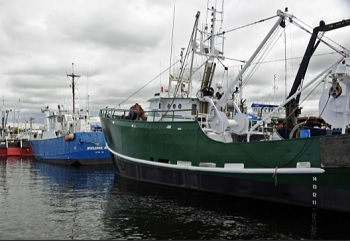
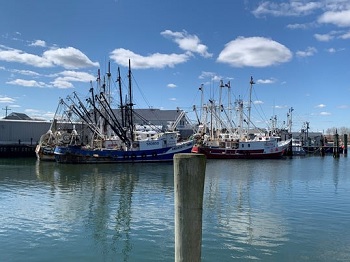
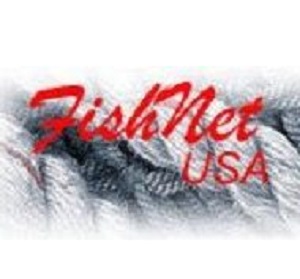
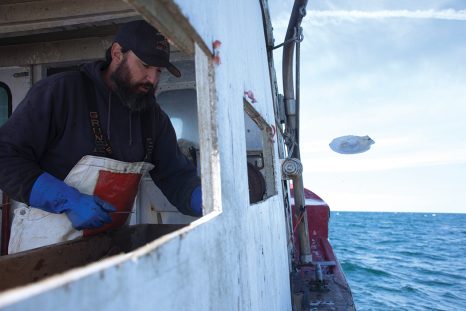
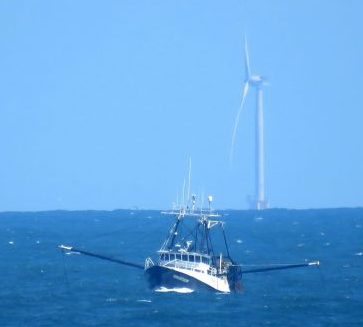
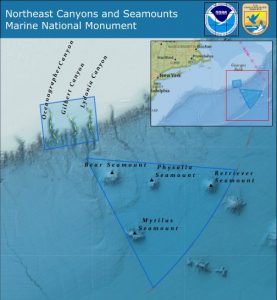 A coalition of New England fishermen organizations filed suit today over former President Barack Obama’s designation of a vast area of ocean as a national monument — a dictate that could sink commercial fishing in New England. The organizations filing the lawsuit are the Massachusetts Lobstermen’s Association, Atlantic Offshore Lobstermen’s Association, Long Island Commercial Fishing Association, Rhode Island Fisherman’s Alliance, and Garden State Seafood Association. They are represented, free of charge, by Pacific Legal Foundation, a watchdog organization that litigates nationwide for limited government, property rights, and a balanced approach to environmental regulations. The lawsuit challenges President Obama’s September 15, 2016, creation of the Northeast Canyons and Seamounts Marine National Monument, 130 miles off the coast of Cape Cod.
A coalition of New England fishermen organizations filed suit today over former President Barack Obama’s designation of a vast area of ocean as a national monument — a dictate that could sink commercial fishing in New England. The organizations filing the lawsuit are the Massachusetts Lobstermen’s Association, Atlantic Offshore Lobstermen’s Association, Long Island Commercial Fishing Association, Rhode Island Fisherman’s Alliance, and Garden State Seafood Association. They are represented, free of charge, by Pacific Legal Foundation, a watchdog organization that litigates nationwide for limited government, property rights, and a balanced approach to environmental regulations. The lawsuit challenges President Obama’s September 15, 2016, creation of the Northeast Canyons and Seamounts Marine National Monument, 130 miles off the coast of Cape Cod. 


























